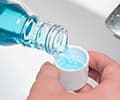Dry Mouth Overview
A lack of saliva is the cause of dry mouth, which is also known as xerostomia. Saliva is released by major and minor salivary glands found throughout your mouth, some of which are microscopic. A low level of saliva production in your glands is a common source of dry mouth and can result from many causes.
Symptoms of dry mouth include:
- A dry, itchy, or sticky feeling in your mouth
- Difficulty with speaking, swallowing, or eating
- Changed taste of foods and drinks
- Difficulty adhering dentures to gums
- A hoarse voice
- Sore or dry throat
- Bad breath
Can Anxiety Cause Dry Mouth?
There are two main ways that those with stress are more likely to experience dry mouth: reduced salivary flow and related medications.
Anxiety
Stress can affect your body in numerous ways and increase your likelihood of developing a large array of conditions, and dry mouth is no exception. Stress and anxiety can affect the flow of your saliva and cause dry mouth, according to the Journal of Dental Research, Dental Clinics, Dental Prospects.
Medication
Many medications cause dry mouth as a side effect, including some prescription and over-the-counter options for anxiety, according to the Cleveland Clinic.
Dry mouth may be a side effect for medications that treat:
- Depression
- Anxiety
- Pain
- Allergies
- Diarrhea and incontinence
- High blood pressure
- Parkinson's disease
Overall, those with anxiety should pay special attention to their oral health because they’re more likely to experience dry mouth and develop other dental problems. According to the Journal of Affective Disorders, those with anxiety are at greater risk of developing dental disease.
If this is troubling, take comfort in the fact that there are many steps you can take to reduce stress and treat dry mouth that are directly in your control.
Helpful tip: Anxiety and associated medications are far from the only cause of dry mouth. We recommend that you schedule an appointment with your dental professional if you’re having trouble discerning the cause of your dry mouth symptoms.
Dry Mouth's Physical Effects
Dry mouth can be thought of as a lack of saliva in your mouth and can lead to discomfort and problems eating, swallowing, or speaking. It also plays an essential role in your long-term dental health.
Surprisingly, saliva is one of your body’s best tools for preventing oral problems and keeping your mouth moisturized and healthy. It helps maintain and support both hard and soft tissues, including your teeth and gums.
Your saliva is vital to your dental health, so much so that the American Dental Association calls it the “bloodstream of the mouth.” Because of this, a lack of saliva can disrupt your body’s proper functioning and lead to dental problems.
Saliva helps to:
- Wash out food matter and debris
- Break down food for swallowing and digestion
- Prevent cavities, gum disease, and infection
- Strengthen your enamel with minerals (calcium, fluoride, and phosphate)
This article is intended to promote understanding of and knowledge about general oral health topics. It is not intended to be a substitute for professional advice, diagnosis or treatment. Always seek the advice of your dentist or other qualified healthcare provider with any questions you may have regarding a medical condition or treatment.
ORAL HEALTH QUIZ
What's behind your smile?
Take our Oral Health assessment to get the most from your oral care routine
ORAL HEALTH QUIZ
What's behind your smile?
Take our Oral Health assessment to get the most from your oral care routine
Join Us
Get the best of your oral health routine and take it to the next level with expert advice, recommendations, products and solutions and special offers.
Join Us
Get the best of your oral health routine and take it to the next level with expert advice, recommendations, products and solutions and special offers.















